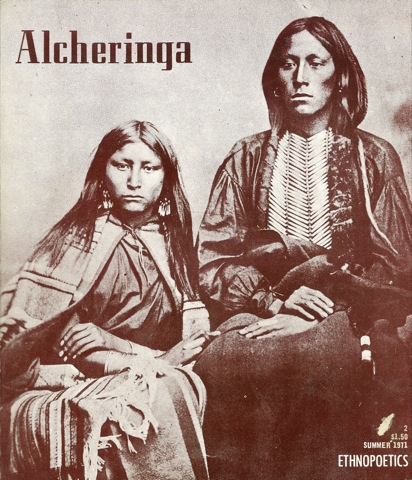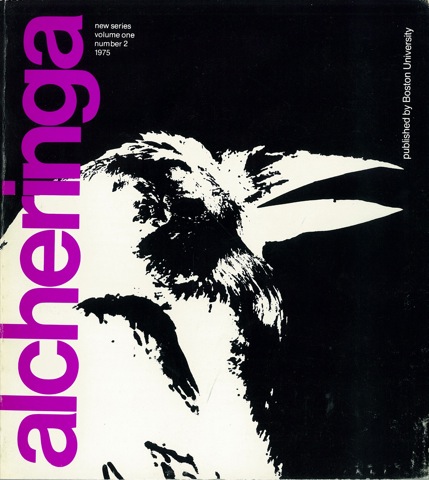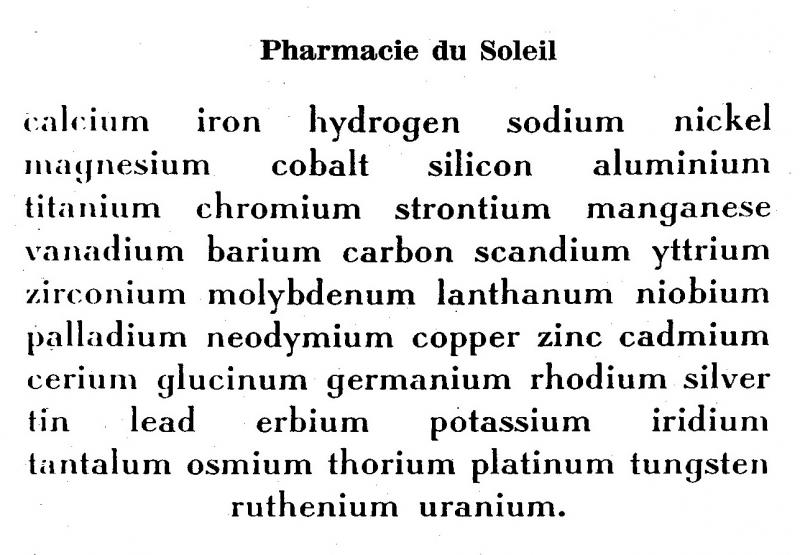(ed. Dennis Tedlock and Jerome Rothenberg)

Reissues is excited to launch an online archive of Alcheringa, the trailblazing ethnopoetics journal edited by Dennis Tedlock and Jerome Rothenberg through Boston University from 1970 to 1980. Commisioned for Internet distribution by Dennis Tedlock and Jon Cotner in 2010, with site design and information architecture by Danny Snelson, the Alcheringa archive presents a robust network of resources including searchable PDFs, high-resolution images, rapid magazine browsing, and full information on each issue and disc insert of this essential journal operating at the crossroads of translation, ethnography, performance, and contemporary poetics. Download searchable PDFs and high-fidelity MP3s here:
Alcheringa (1970–1980)
Ed. Dennis Tedlock & Jerome Rothenberg
Download the complete magazine (74 MB)
Dennis Tedlock's Introduction
Record Inserts on PennSound
First Series
Vol. 1, No. 1, 1970 [PDF]
Vol. 1, No. 2, 1971 [PDF] [MP3: 1, 2]
Vol. 1, No. 3, 1971 [PDF]
Vol. 1, No. 4, 1972 [PDF] [MP3: 1, 2]
Vol. 1, No. 5, 1973 [PDF] [MP3: 1, 2]
New Series
Vol. 1, No. 1, 1975 [PDF] [MP3: 1, 2]
Vol. 1, No. 2, 1975 [PDF] [MP3: 1, 2]
Vol. 2, No. 1, 1976 [PDF] [MP3: 1, 2]
Vol. 2, No. 2, 1976 [PDF]
Vol. 3, No. 1, 1977 [PDF] [MP3: 1, 2]
Vol. 3, No. 2, 1977 [PDF] [MP3: 1, 2]
Vol. 4, No. 1, 1978 [PDF] [MP3: 1, 2]
Vol. 4, No. 2, 1980 [PDF]
 Opening a new series of the journal in 1975, Jerome Rothenberg and Dennis Tedlock clearly define their editorial aims:
Opening a new series of the journal in 1975, Jerome Rothenberg and Dennis Tedlock clearly define their editorial aims:
[...] As the first magazine of the world's tribal poetries, ALCHERINGA will offer a place where tribal poetry can appear in English translation and can act (in the oldest and newest of poetic traditions) to change men's minds and lives. It will be aiming at the startling and revelatory presentation that has been common to our own avant-gardes. By exploring the full range of man's poetries, we hope
— to enlarge our understanding of what a poem may be
— to provide a ground for experiments in the translation of tribal/oral poetry and a forum for the discussion of the problems and possibilities of translation from widely divergent languages and cultures
— to encourage poets to participate actively in the translation of tribal/oral poetry
— to encourage ethnologists and linguists to do work increasingly ignored by academic publications in their fields, namely to present tribal poe tries as values in themselves rather than as ethnographic data
— to initiate cooperative projects along these lines among poets, ethnologists, performers, and others
— to emphasize by example and commentary the relevance of tribal poetry to where-we-are today.
As in the five issues of the Old Series, the new ALCHERINGA will continue to publish, from all over the world, transcriptions and translations of oral poems from living traditions, ancient texts with oral roots, and modern experiments in oral poetry. There will be songs, chants, prayers, visions and dreams, sacred narratives, fictional narratives, histories, ritual scenarios, praises, namings, word games, riddles, proverbs, sermons. These will take the shape of performable scripts (meant to be read aloud rather than silently), experiments in typography, diagrams, and insert disc recordings.
in the five issues of the Old Series, the new ALCHERINGA will continue to publish, from all over the world, transcriptions and translations of oral poems from living traditions, ancient texts with oral roots, and modern experiments in oral poetry. There will be songs, chants, prayers, visions and dreams, sacred narratives, fictional narratives, histories, ritual scenarios, praises, namings, word games, riddles, proverbs, sermons. These will take the shape of performable scripts (meant to be read aloud rather than silently), experiments in typography, diagrams, and insert disc recordings.
In addition to poems, ALCHERINGA will publish, more often than in the past, essays dealing with problems of translation and presentation, interviews with oral performers, and explorations of the meaning of tribal cultures for Western urban culture. To these established topics will be added the problem of the sacred/powerful dimension of language and its possible restoration in English: just as we have desecrated the landscape, so we have carelessly depleted the potent resources oflanguage. In tribal ontologies, cosmologies, and the poetries that present them may be found the answers, or the beginnings of the answers, to both these problems.
Philosophically, ALCHERINGA finds itself close to hermeneutic phenomenology. In the words of Paul Ricoeur:
We wish to recharge language, start again from the fullness of language.... The same age develops the possibility of emptying language and the possibility of filling it anew. It is therefore no yearning for a sunken Atlantis that urges us on, but the hope of a re-creation of language. Beyond the wastelands of critical thought, we seek to be challenged anew.
The poets of ALCHERINGA start with the voice. The essayists will look, ultimately, to the very origins of poetry. ALCHERINGA will be radical — that is, going to the center — in approaching the Word.
alcheringa [Arunta of Australia, alcheringa], n. 1. The Eternal Dream Time, The Dreaming of a sacred heroic time long ago when man and nature came to be, a kind of narrative of things that once happened. 2. A kind of charter of things that still happen. 3. A kind of logos or principle of order transcending everything significant. v. 1. The act of dreaming, as reality and symbol, by which the artist is inspired to produce a new song. 2. The act by which the mind makes contact with whatever mystery it is that connects the Dreaming and the Here-and-Now.
— adapted from W.E.H. Stanner
Featuring a diverse array of scholars, ethnologists, poets, and translators over its thirteen-issue run from 1970 to 1980, Alcheringa presents a rich historical document as well as a vital resource for contemporary poetry and poetics. The breadth of Alcheringa’s editorial project includes early publications of David Antin’s talk poems and Ron Silliman’s originary collection of Language poetry alongside Zuni translations by Dennis Tedlock and Seneca “total translations” by Jerome Rothernberg. Issues include writings and recordings by Jaime de Angulo, David Antin, Ulli Beier, Michel Benamou, Harry Crosby, Diane DiPrima, Charles Doria, Ted Enslin, Clayton Eshleman, Edouard Glissant, Anselm Hollo, Dell Hymes, Fredric Jameson, Pierre Joris, Robert Kelly, Harris Lenowitz, Jackson MacLow, Steve McCaffery, b. p. nichol, Pauline Oliveros, Charles Olson, Simon Ortiz, Ezra Pound, George Quasha, Jerome Rothenberg, Armand Schwerner, Ron Silliman, Gary Snyder, Charles Stein, Susan Stewart, Nathaniel Tarn, Dennis Tedlock, Anne Waldman, Karl Young, and Louis Zukofsky, among many others.
Harry Crosby, from Alcheringa 1, no. 5, 1973.

